|
|
|
Sort Order |
|
|
|
Items / Page
|
|
|
|
|
|
|
| Srl | Item |
| 1 |
ID:
158362
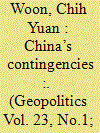

|
|
|
|
|
| Summary/Abstract |
This paper examines the intimate relationship between narratives emanating from China and their uses of Chinese history, and how such perspectives inform China’s geopolitical positioning and practices in lieu of its purported ‘rise’. Taking inspiration from the deconstructive impetus of critical geopolitics, this article contends that these historical claims to China’s rise constitute deterministic accounts, hinging on the notion of Chinese exceptionalism to provide discursive backing for a Sinocentric geopolitical order in the coming decades. This in turn downplays ‘alternative’ historiographies that can shed light on how the nature of China’s emergence may be more dependent on and shaped by the external environment than previously acknowledged. Building on the historical-geographical expositions related to the idea of contingency, this article demonstrates how China (whether it be in the past or present) cannot be seen as operating in a vacuum but has to constantly negotiate and adjust its strategy of engagements/interactions based on the specific demands imposed by world politics. Specifically, by elucidating these dimensions through cross-strait relations between China and Taiwan, it is argued that understanding China’s contingencies can raise important questions for us to critically appreciate the contextual actors, processes and relationships that differentially impact on China’s engagements in the world.
|
|
|
|
|
|
|
|
|
|
|
|
|
|
|
|
| 2 |
ID:
158367
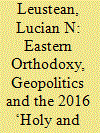

|
|
|
|
|
| Summary/Abstract |
In March 2014, at the time of Russia’s takeover of Crimea, the heads of 14 Orthodox churches convened under the leadership of Ecumenical Patriarch Bartholomew, the Istanbul-based primus inter pares in Eastern Orthodoxy, and announced that a ‘Holy and Great Synod of the Orthodox Church’ would be held in 2016. The Synod, which took place in June 2016 in Crete, was a unique ecclesiastical gathering, bringing together competing geopolitical visions of religion, state and power. This article examines the political mobilisation of Orthodox churches by contextualising the holding of the Synod in relation to Russia’s advancement of spiritual security after the end of the Cold War. It provides a textual analysis of Synodical documents and highlights the patterns of religious and political structures in the contemporary Eastern Orthodox world.
|
|
|
|
|
|
|
|
|
|
|
|
|
|
|
|
| 3 |
ID:
158364


|
|
|
|
|
| Summary/Abstract |
The article analyses how the Europeans (meaning European states and the EC/EU) have progressively turned a discourse about the Israeli-Palestinian border into a foreign policy practice. While much of the literature highlights the existence of a ‘gap between discourse and practice’ when it comes to Europeans’ foreign policy stance towards the Arab-Israeli conflict, we argue that the gap is dynamic and has changed across time. In the absence of an internationally and locally recognised border between Israel and Palestine, the Europeans have aimed at constructing one on the 1949 armistice line, the so-called Green Line. They have done so in stages, by first formulating a discursive practice about the need for a border, then establishing economic practices in the late 1980s-early 1990s, and most recently practicing a legal frame of reference for relations with Israel and the Palestinian Authority (PA) based on the Green Line. The outcome is that, for what concerns European countries and EU legislation, the Green Line has been increasingly taken as the Israeli-Palestinian border. However, gaps never fully close and more contemporary events seem in fact to point to a re-opening of the gap, as the article explores.
|
|
|
|
|
|
|
|
|
|
|
|
|
|
|
|
| 4 |
ID:
158356
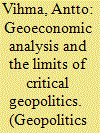

|
|
|
|
|
| Summary/Abstract |
There is a new wave of interest in the interplay between commerce and strategy, and ‘geoeconomics’ is again becoming a key concept in policy analysis. In the academia, however, since the emergence of the concept in the early 1990s, geoeconomic analysis has mostly been viewed through very critical lenses. Analysts have portrayed geoeconomics as simplified neorealism, as a neoliberal discourse, and as a securitisation project. This criticism of geoeconomics relies on an incomplete view of IR realism, as well as some oversimplifications of Luttwak, who introduced the term in 1990. This article underscores the relative property of Luttwak’s argument, in which economic means are gaining in importance in relation to military power, and countries are increasingly, but not always, turning to logic of conflict and geoeconomic policies. Luttwak also underscores the role of domestic politics and ideologies in determining whether a country engages in geoeconomic behaviour or not. The article suggests that strategic geoeconomic theory-building, inspired by but not limited to Luttwak, has much to contribute to our contemporary understanding of IR and geography, for example, in the analysis of strategy and the different power capabilities of states.
|
|
|
|
|
|
|
|
|
|
|
|
|
|
|
|
| 5 |
ID:
158360
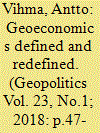

|
|
|
|
|
| Summary/Abstract |
In response to comments on a longer article, this essay notes that several scholars define geoeconomics in remarkably broad terms, covering an array of things: borderless economic zones, strategic economic instruments of foreign policy, both neoliberalism and economic nationalism, and so forth. Something is surely gained, but also lost, in developing the concept of geoeconomics towards this all-encompassing direction. The risk is that the concept becomes overly extensive and loses its analytical power.
|
|
|
|
|
|
|
|
|
|
|
|
|
|
|
|
| 6 |
ID:
158358
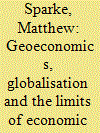

|
|
|
|
|
| Summary/Abstract |
This paper is a response to Antto Vihma’s article ‘Geoeconomic Analysis and the Limits of Critical Geopolitics: A New Engagement with Edward Luttwak’. Taking issue with Vihma’s critique of the limits of critical geopolitics, it argues that it is instead the use of economic strategies in statecraft – Vihma’s state-centric vision of geoeconomics inspired by Edward Luttwak – that is really better understood as limited. To map these limitations, it is necessary to attend to three specific limits: first, the limits of conceptualising geoeconomics in simply instrumental terms as a tool of statecraft; second, the limits of capital and specifically the ways in which the geographical limits created by the on-going tensions between spatial fixity and spatial expansion in capitalism are refracted through the on-going entanglements of geopolitics and geoeconomics; and third, the limits of personal positionality and the emotional fears, hopes, dreams and passions that influence geostrategic discourse more generally. Reflecting on Donald J. Trump’s ascendancy to the US presidency, the paper concludes that it is now more necessary than ever to address how all these force-fields intersect to overdetermine the limits of economic strategy in statecraft.
|
|
|
|
|
|
|
|
|
|
|
|
|
|
|
|
| 7 |
ID:
158361


|
|
|
|
|
| Summary/Abstract |
In the last 15 years, a new generation of TV series based on complex storytelling and frequently focused on politics has emerged. Critics and commentators have identified this as a new golden age for television, frequently emphasising the accuracy and originality of this generation of TV series, and highlighting its capacity to represent different aspects of our world in an effective and innovative manner. Peculiar and original characters in political TV series are also being recognised in academic studies; in particular, these programs have attracted diffused interest in cultural and political studies and more recently also in popular geopolitics. The aim of this article is to contribute to this debate by analysing the ambivalent geopolitical perspectives transmitted within these forms of contemporary media products. By focusing on the political and legal series The Good Wife, produced by CBS between 2009 and 2016, the paper shows how original and challenging representations of politics and society pair well with very traditional and stereotyped geopolitical representations. Consequently, the paper suggests that in many cases, the acclaimed originality in the form of TV series conceals old and stereotyped contents.
|
|
|
|
|
|
|
|
|
|
|
|
|
|
|
|
| 8 |
ID:
158365


|
|
|
|
|
| Summary/Abstract |
In 2015, the isolated border region of Kokang in Myanmar experienced armed conflict reported around the world. Most of the estimated 100,000 refugees from the conflict crossed the border to China, while hostilities continued for six months. Unlike other ethnic minorities fighting Myanmar’s government forces all along the extensive, mountainous border with China, the Kokang is largely of Han Chinese origin with a well established and nurtured relationship with China. Based on 458 questionnaires and interviews, media reports and official government releases, this article explores the varying imaginaries of territory, security and geopolitics of distant Kokang, from refugees now in China, Chinese from adjacent Yunnan and other provinces, as well as analysts viewing the conflict from afar. The study offers a lens for border studies to view the multi-scalar and extended geopolitics of nation states and their peripheral sub-national components. Specifically, the article addresses the changing role of the border under conditions of conflict and security enhancement and the malleable definition of borderlands territory. The study reveals how borders are utilised creatively by territorial inhabitants, their neighbours and their governments, how borders work in remote places, and how cross-border culture operates even in conflict situations to mediate borders. It enlarges our understanding of evolving borders in the space between exception and integration emerging in simultaneous globalisation and localisation.
|
|
|
|
|
|
|
|
|
|
|
|
|
|
|
|
| 9 |
ID:
158359
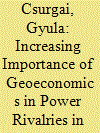

|
|
|
|
|
| Summary/Abstract |
Relations between states in the post-Cold War period have been shaped by an increased economic competition including ‘non-market’ factors such as intelligence sharing between state agencies and private businesses, successful economic diplomacy and different techniques to influence and manipulate non-governmental organisations to weaken an economic adversary, among other things. The considerable influence of these non-market factors illustrates the limits of the liberal economic theories that emphasise the dominant role of market forces. Geoeconomics is an interdisciplinary analysis that includes geopolitical factors, economic intelligence, strategic analysis and foresight and has the objective to provide a tool for states and businesses to develop and implement successful strategies to conquer markets, and protect strategic segments of the domestic economy, among other things. This article argues about the growing significance of geoeconomics in contemporary power rivalries, presents some strategic aspects of the role of state in the establishment and coordination of a national geoeconomic disposition, and highlights briefly the importance of the strategic management of information to support geoeconomic strategies. Some arguments of the article ‘Geoeconomic Analysis and the Limits of Critical Geopolitics: A New Engagement with Edward Luttwak’ are briefly discussed as well.
|
|
|
|
|
|
|
|
|
|
|
|
|
|
|
|
| 10 |
ID:
158366


|
|
|
|
|
| Summary/Abstract |
Despite a growing body of work, scholars have rarely engaged with the classic divide of structure and agency in border studies. Drawing on theory of structuration by Anthony Giddens, this article proposes a theoretical approach and/or tool that views borders as the result of a continuous production and reproduction of structure(s) and agents. The framework offers an analysis of what makes each border distinct and of the performance of borderwork. The article briefly overviews major theoretical approaches in critical border studies, presents a brief summary of the theory of structuration, discusses the proposed theoretical framework for border studies, and presents a case study based on the recently exchanged Bangladesh-India border enclaves to demonstrate the application of this framework.
|
|
|
|
|
|
|
|
|
|
|
|
|
|
|
|
| 11 |
ID:
158363


|
|
|
|
|
| Summary/Abstract |
This article adapts and applies a securitisation framework to produce an analytical explanation for the heightened geopolitical status of climate change over the past decade, as demonstrated by the breakthrough Paris Agreement of 2015. Rather than speech acts invoking security, the focus of this analysis is on the socio-scientific discourse of global climate crisis that emerged in the several year period leading to the 2009 COP 15 conference in Copenhagen. Two types of experts—contributory and interactional—are identified as the essential and interdependent actors that engaged in ‘crisification’, a novel crisis-based perspective on political agenda setting, in which climate crisis served as a primary discursive device employed by prominent advocates of urgent action. Contributory experts, that is, authoritative climate scientists and their institutions, together with interactional experts—non-scientist social actors who appropriated and mediated scientific data and knowledge in framing climate change as a global crisis—constituted an extended epistemic community of climate advocates. Through an array of speech acts, this extended community effectively co-constructed a convincing climate crisis discourse that consisted of quantitative data artefacts based on CO2 concentration and global mean temperature, and qualitative invocations of existential threat to human civilisation, which contributed to the ascent of climate change on the global political agenda. In proposing crisification as a complement to securitisation, the article offers a theoretical innovation that facilitates constructivist analysis of issues framed as crises, including geopolitical problems in certain non-military sectors where crisis is a favoured label for perceived threats to core values.
|
|
|
|
|
|
|
|
|
|
|
|
|
|
|
|
| 12 |
ID:
158357
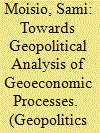

|
|
|
|
|
| Summary/Abstract |
In his article, Antto Vihma seeks to develop a geoeconomic approach that draws from Edward N. Luttwak’s conception of inter-state competition, and suggests that a more nuanced reading of Luttwak provides a way forward. In this essay, I first tease out and discuss Vihma’s arguments, before calling for the need to develop geopolitical analysis of contemporary geoeconomic processes. This kind of geopolitical analysis focuses on the political imaginaries that frame the world in terms of economic expansion, new kinds of inter-spatial competition, connectivity and pace or global integration and connectivity. These imaginaries have become increasingly salient in state-centric political debates on national interests, national security, and national identity.
|
|
|
|
|
|
|
|
|
|
|
|
|
|
|
|
| 13 |
ID:
158368


|
|
|
|
|
| Summary/Abstract |
Recent migration ‘crises’ raise important geopolitical questions. Who is ‘the migrant’ that contemporary politics are fixated on? How are answers to ‘who counts as a migrant’ changing? Who gets to do that counting, and under what circumstances? This forum responds to, as well as questions, the current saliency of migration by examining how categories of migration hold geopolitical significance—not only in how they are constructed and by whom, but also in how they are challenged and subverted. Furthermore, by examining how the very concepts of ‘migrant’ and ‘refugee’ are used in different contexts, and for a variety of purposes, it opens up critical questions about mobility, citizenship and the nation state. Collectively, these contributions aim to demonstrate how problematising migration and its categorisation can be a tool of enquiry into other phenomena and processes.
|
|
|
|
|
|
|
|
|
|
|
|
|
|
|
|
|
|
|
|
|